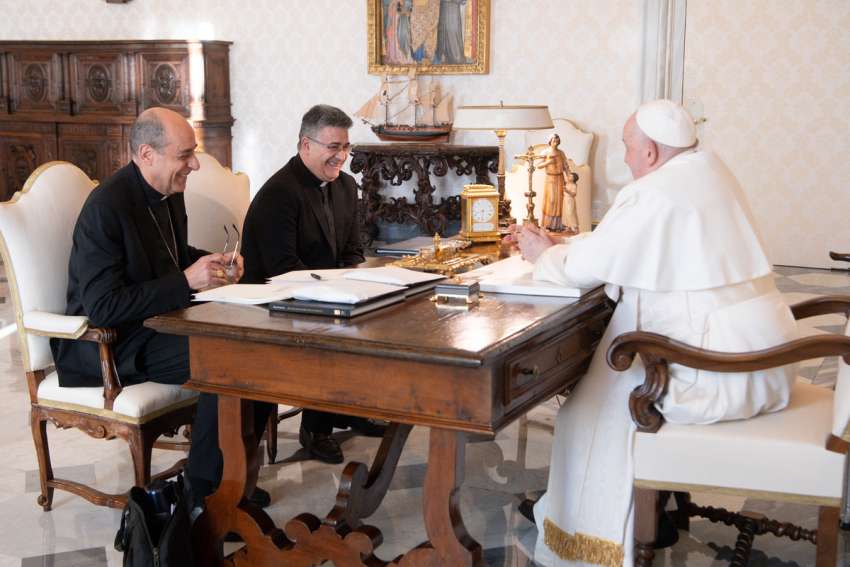VATICAN CITY -- A Catholic priest can bless a gay or other unmarried couple as long as it is not a formal liturgical blessing and does not give the impression that the Catholic Church is blessing the union as if it were a marriage, the Vatican doctrinal office said.
The request for a blessing can express and nurture "openness to the transcendence, mercy and closeness to God in a thousand concrete circumstances of life, which is no small thing in the world in which we live. It is a seed of the Holy Spirit that must be nurtured, not hindered," the Dicastery for the Doctrine of the Faith said in a formal declaration published Dec. 18.
The document, "Fiducia Supplicans" ("Supplicating Trust") was subtitled, "On the pastoral meaning of blessings," and was approved by Pope Francis during an audience with Cardinal Víctor Manuel Fernández, dicastery prefect, Dec. 18.
In his introductory note, Cardinal Fernández said questions about a priest blessing a LGBTQ+ or other unmarried couple had been sent to the doctrinal office repeatedly over the past few years.
The need for a fuller explanation of blessings became clear, he wrote, after Pope Francis responded to the "dubia" or questions of several cardinals in a letter released in early October.
In his letter, the pope insisted marriage is an "exclusive, stable and indissoluble union between a man and a woman, naturally open to conceiving children," which is why the church "avoids all kinds of rites or sacramentals that could contradict this conviction and imply that it is recognizing as a marriage something that is not."
At the same time, the pope said, "pastoral prudence must adequately discern if there are forms of blessing, solicited by one or various persons, that don't transmit a mistaken concept of marriage."
Cardinal Fernández said the declaration "remains firm on the traditional doctrine of the Church about marriage, not allowing any type of liturgical rite or blessing similar to a liturgical rite that can create confusion," but it also explores the "pastoral meaning of blessings" in a way that opens "the possibility of blessing couples in irregular situations and same-sex couples without officially validating their status or changing in any way the Church's perennial teaching on marriage."
The church "remains firm" in teaching that marriage can be contracted only between one woman and one man, he said, and continues to insist that "rites and prayers that could create confusion" about a marriage and another form of relationship "are inadmissible."
But in Catholic tradition blessings go well beyond the formal ritual used in marriage and other sacraments.
"Blessings are among the most widespread and evolving sacramentals. Indeed, they lead us to grasp God's presence in all the events of life and remind us that, even in the use of created things, human beings are invited to seek God, to love him, and to serve him faithfully," the declaration said. That is why people, meals, rosaries, homes, pets and myriad other things can be and are blessed on various occasions.
"From a strictly liturgical point of view," the declaration said, "a blessing requires that what is blessed be conformed to God's will, as expressed in the teachings of the Church," which is why the then-doctrinal congregation in 2021 excluded the possibility of blessing gay couples.
But, the new document said, Catholics should "avoid the risk of reducing the meaning of blessings" to their formal, liturgical use because that "would lead us to expect the same moral conditions for a simple blessing that are called for in the reception of the sacraments."
"Indeed, there is the danger that a pastoral gesture that is so beloved and widespread will be subjected to too many moral prerequisites, which, under the claim of control, could overshadow the unconditional power of God's love that forms the basis for the gesture of blessing," it said.
A person who asks for God's blessing, the declaration said, "shows himself to be in need of God's saving presence in his life and one who asks for a blessing from the Church recognizes the latter as a sacrament of the salvation that God offers."
The church, it said, should be grateful when people ask for a blessing and should see it as a sign that they know they need God's help.
"When people ask for a blessing, an exhaustive moral analysis should not be placed as a precondition for conferring it. For, those seeking a blessing should not be required to have prior moral perfection," it said.
At the same time, the declaration insisted that the Mass is not the proper setting for the less formal forms of blessing that could include the blessing of a gay couple, and it repeated that "it is not appropriate for a diocese, a bishops' conference" or other church structure to issue a formal blessing prayer or ritual for unwed couples. The blessing also should not be given "in concurrence" with a civil marriage ceremony to avoid appearing as a sort of church blessing of the civil union.
However, it said, a priest or deacon could "join in the prayer of those persons who, although in a union that cannot be compared in any way to a marriage, desire to entrust themselves to the Lord and his mercy, to invoke his help and to be guided to a greater understanding of his plan of love and of truth."

